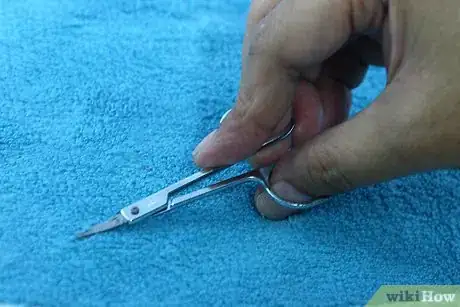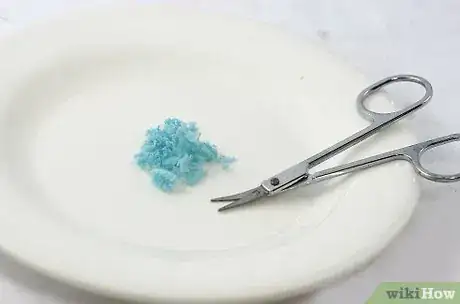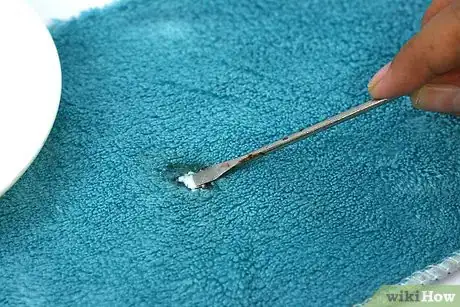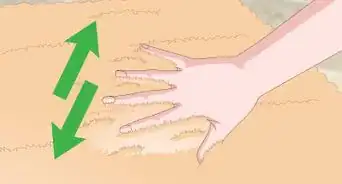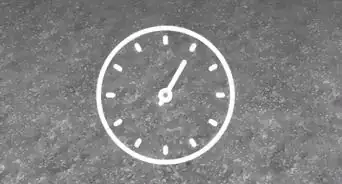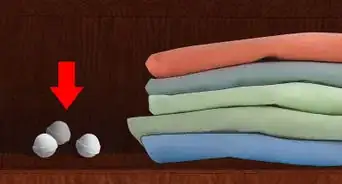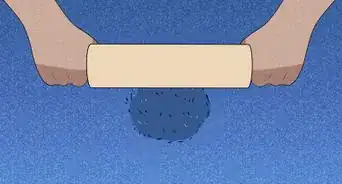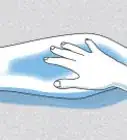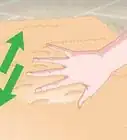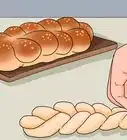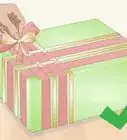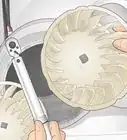wikiHow is a “wiki,” similar to Wikipedia, which means that many of our articles are co-written by multiple authors. To create this article, 10 people, some anonymous, worked to edit and improve it over time.
This article has been viewed 143,861 times.
Learn more...
Follow the steps below for a practical and affordable way to repair cigarette burns without having to replace the damaged carpet. It’s as simple as replacing the burnt fibers, and in some cases, removing scorch marks surrounding the burned area.
Steps
Repairing Small Cigarette Burns
-
1Snip away the singed edges of the carpet with fine manicure scissors.[1]
-
2Use tweezers to pull out the burned fibers and discard the along with the singed clippings.Advertisement
-
3Use your fine manicure scissors to cut out a small amount of undamaged carpet strands from another area of the carpet that is hidden from view.[2]
-
4Place the clean fibers in a small dish. You will need enough new fibers to fill the burn hole.
-
5Apply strong household glue to the damaged area where you have removed the burnt fibers.[3]
-
6Use tweezers to press the clean fibers into the gluey spot.[4]
-
7Cover the repaired area with a heavy object, such as a thick book, for several days.
-
8Comb the repaired area with a wide-toothed comb, or plump up the new fibers with your fingers so that it blends in with the rest of the carpet.
Repairing Large Cigarette Burns
Burns too large to be filled with fiber strands can be repaired by using a replacement piece of carpet. You can accomplish this if you have extra remnants from the carpet, or if you have a carpeted closet area that you don’t mind cutting into.
-
1Prepare the burned area by cutting out all the burned fibers with a sharp knife or blade.
-
2Vacuum the debris, making sure you remove all burnt fibers out of the damaged area.[5]
-
3Measure the burned area.[6]
- If you managed to cut it out in one piece, you can use that piece as your stencil.
- If you didn’t managed to cut out the damaged section of carpet in one piece, cut a piece of paper the size of the damaged area plus 1 inch (2.54 cm) on all sides.
-
4Place the damaged stencil or paper template over the piece of replacement carpeting you plan to use.
-
5Outline the desired shape on the carpet with a washable marker.
-
6Use a sharp knife or blade to cut out the replacement carpet piece.[7]
-
7Apply carpet cement to the damaged area, using manufacturer’s recommendations.
-
8Press the new carpet piece into place.[8]
-
9Cover the replacement piece with a towel.
-
10Place a heavy object or objects on the repaired area, and leave them on for several days.[9]
-
11Gently fluff up the fibers around the new seams with a wide-tooth comb or with your fingers so that the new piece blends in with the existing carpet.[10]
Community Q&A
Did you know you can get answers researched by wikiHow Staff?
Unlock staff-researched answers by supporting wikiHow
-
QuestionCan I stencil a synthetic rug to cover the burn?
 wikiHow Staff EditorThis answer was written by one of our trained team of researchers who validated it for accuracy and comprehensiveness.
wikiHow Staff EditorThis answer was written by one of our trained team of researchers who validated it for accuracy and comprehensiveness.
Staff Answer wikiHow Staff EditorStaff AnswerThis might be possible provided the burn area will allow the paint to take. Paint suitable for the rug is likely to be acrylic or fabric paint, or a spray paint. Test a small area first to see if the paint works for the rug (allow to dry before assuming it has taken, as it may peel off). The stencil design will need to be able to either cover the burn or incorporate it into your design. You may also need to consider adding the stencil design to other parts of the rug to ensure that it looks balanced.
wikiHow Staff EditorStaff AnswerThis might be possible provided the burn area will allow the paint to take. Paint suitable for the rug is likely to be acrylic or fabric paint, or a spray paint. Test a small area first to see if the paint works for the rug (allow to dry before assuming it has taken, as it may peel off). The stencil design will need to be able to either cover the burn or incorporate it into your design. You may also need to consider adding the stencil design to other parts of the rug to ensure that it looks balanced.
Warnings
- Carpet fibers and segments in hidden areas and closets may not be the same color as the piece you are attempting to repair. Sun and heavy use can fade carpets, so be aware of any color variations before taking replacement fibers.⧼thumbs_response⧽
- Carpet professionals should handle the repair of burned areas larger than a few inches (about 5 cm) in area.⧼thumbs_response⧽
Things You’ll Need
- Manicure scissors
- Tweezers
- Small bowl or container
- Strong household glue
- Sharp knife or blade
- Carpet cement
- Vacuum
- Razor blade
- Paper
- Heavy book or other heavy object
- Towel
- Wide-toothed comb
References
- ↑ https://www.apartmenttherapy.com/quick-tip-26-how-to-repair-carpet-burn-marks-martha-stewart-154163
- ↑ https://www.apartmenttherapy.com/quick-tip-26-how-to-repair-carpet-burn-marks-martha-stewart-154163
- ↑ https://removeandreplace.com/2014/04/26/how-to-repair-a-burn-mark-from-carpet/
- ↑ https://www.youtube.com/watch?v=EPYAUV-fZl0
- ↑ https://www.cleanipedia.com/gb/floor-and-surface-cleaning/how-to-fix-a-burnt-carpet.html
- ↑ https://www.cleanipedia.com/gb/floor-and-surface-cleaning/how-to-fix-a-burnt-carpet.html
- ↑ https://www.cleanipedia.com/gb/floor-and-surface-cleaning/how-to-fix-a-burnt-carpet.html
- ↑ https://removeandreplace.com/2014/06/09/how-to-fix-a-carpet-burn-from-an-iron/
- ↑ https://www.youtube.com/watch?v=EPYAUV-fZl0


